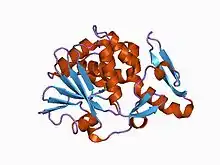Momordin (protein)
Momordin or α-momorcharin is one of several related proteins isolated from several plants of the genus Momordica, which includes the bitter melon (M. charantia) and the balsam apple (M. balsamina).

α-Momorcharin (1aha EBI).
These enzymes are potent inhibitor of protein synthesis in eukaryotes by inactivating the ribosomes.[1][2][3] However its cytotoxic activity is limited because it is not taken up by the cells; it has to be chemically modified to do so.[4]
There are several variants, including momordin II (from M. balsamina)[1][5] and momordin-a (from M. charantia).[3][6]
See also
- Momordin (saponin), an unrelated compound (a saponin of the triterpenoid oleanic acid).
References
- Ortigao, M.; Better, M. (1992). "Momordin II, a ribosome inactivating protein from Momordica balsamina, is homologous to other plant proteins". Nucleic Acids Research. 20 (17): 4662. doi:10.1093/nar/20.17.4662. PMC 334202. PMID 1408771.
- Husain, J.; Tickle, I. J.; Wood, S. P. (1994). "Crystal structure of momordin, a type I ribosome inactivating protein from the seeds of Momordica charantia". FEBS Letters. 342 (2): 154–158. doi:10.1016/0014-5793(94)80491-5. PMID 8143869.
- Minami, Y.; Funatsu, G. (1993). "The complete amino acid sequence of momordin-a, a ribosome-inactivating protein from the seeds of bitter gourd (Momordica charantia)". Bioscience, Biotechnology, and Biochemistry. 57 (7): 1141–1144. doi:10.1271/bbb.57.1141. PMID 7763984.
- Leamon, C. P.; Low, P. S. (1992). "Cytotoxicity of momordin-folate conjugates in cultured human cells". The Journal of Biological Chemistry. 267 (35): 24966–24971. PMID 1460001.
- Valbonesi, P.; Barbieri, L.; Bolognesi, A.; Bonora, E.; Polito, L.; Stirpe, F. (1999). "Preparation of highly purified momordin II without ribonuclease activity". Life Sciences. 65 (14): 1485–1491. doi:10.1016/s0024-3205(99)00389-6. PMID 10530800.
- Minami, Y.; Islam, M. R.; Funatsu, G. (1998). "Chemical modifications of momordin-a and luffin-a, ribosome-inactivating proteins from the seeds of Momordica charantia and Luffa cylindrica: Involvement of His140, Tyr165, and Lys231 in the protein-synthesis inhibitory activity". Bioscience, Biotechnology, and Biochemistry. 62 (5): 959–964. doi:10.1271/bbb.62.959. PMID 9648227.
This article is issued from Wikipedia. The text is licensed under Creative Commons - Attribution - Sharealike. Additional terms may apply for the media files.